2.06
There Is Nothing Left to Say On the Invisibles
Dreams Like This
by Travis Hedge Coke
“Enoch shall break them.”
– a Luddite rallying cry
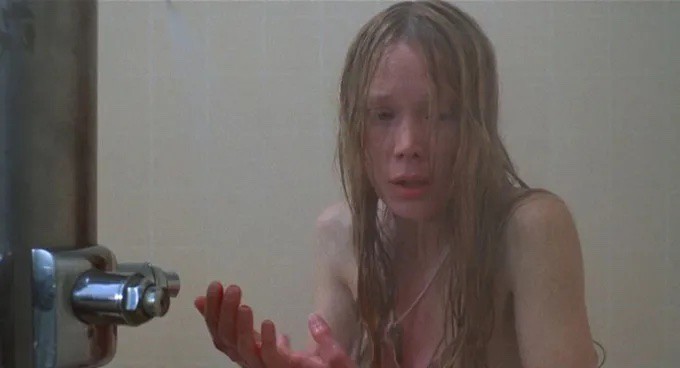
There is a scene in The Invisibles, of two more or less cishet, leftist, white, intellectual men; Mason Lang trying to tell King Mob about his mother’s first menstruation, and Mob being unable to listen, because to him, it is a scene from Brian De Palma’s adaptation of Stephen King’s Carrie. A scene meant to represent real experiences overtakes, for King Mob who has not had a similar experience, the real life experience’s possibility.
I have a clear memory of dreaming that I cut out a Brian Bolland painting from a magazine. A pantsless figure stands with scepter and cape, a king with no face, a blur for a head. I cut it out and I placed it at the back of my locker, as as I put it to the back wall, I understood that because of the angle of the locker walls, the claustrophobic closeness of metal and air, I could push past the back of the locker into something else.
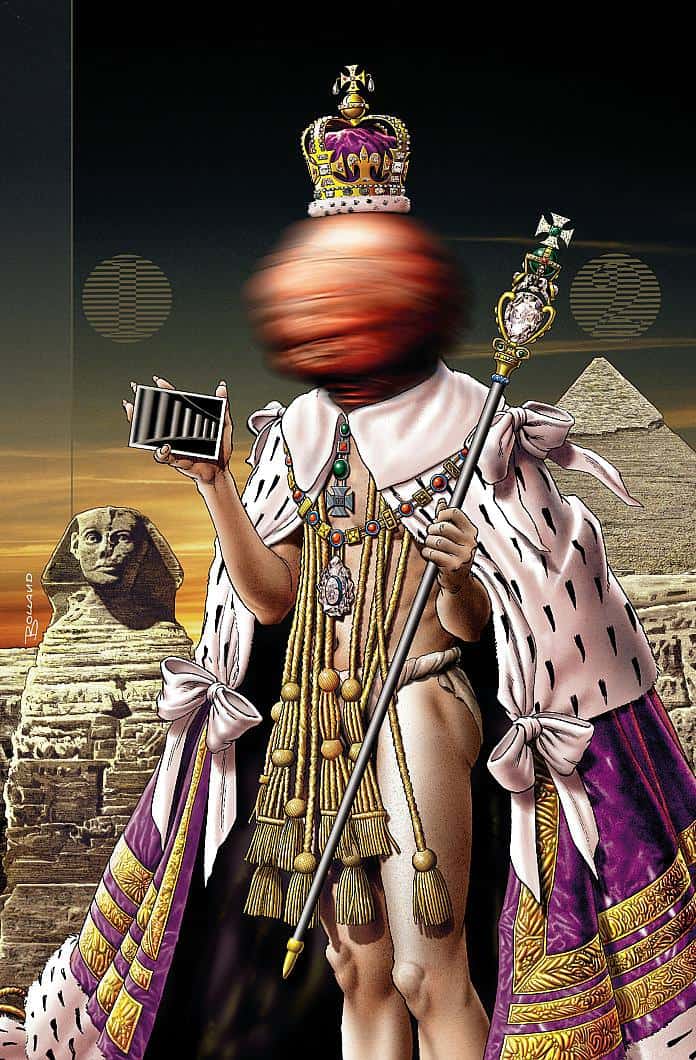
A few years later, Bolland would make that painting, the cover to the first issue of The Invisibles’ third volume, #12. I have a memory, from around that time, of seeing the cover reproduced in a Comics Shop News or similar trade organ.
Did I dream that dream? Did I see the cover reproduced in a newsletter?
I remember both, but I would never swear to either. And, not only because I am afraid to swear to almost anything I remember if you put my back hard enough against the wall.
In The Invisibles, Mister Six says, “The paint is wet on everything, if you squint hard enough.”
I sleep with my eyes open.
Sometimes it is hard to say. Sometimes, it is easy to say, but you should hold your tongue, hedge your bets, double-check, and still not say.
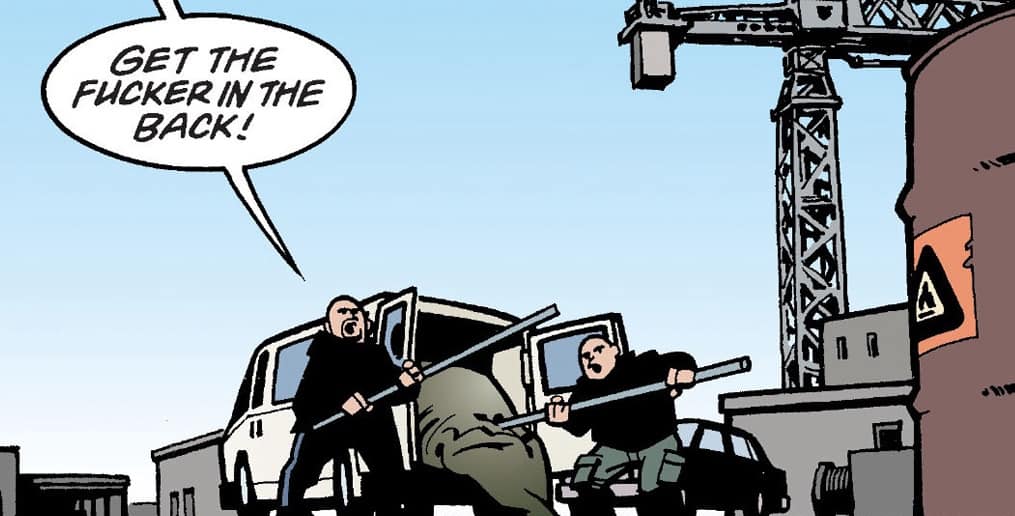
I dreamt a sequel to The Invisibles, once, called, Department X: Get the Fucker in the Back. Later, someone told me Grant Morrison joked if they did a Department X miniseries, that would make a good title. The thing, though, is that, as a title, it takes new meanings separate from the scene in which it is used, but also, it seems odd that it would be in my dream and fly for Grant Morrison. People say Morrison says a lot of things, or has done many things, which they have not.
Who is to say?
A fair part of The Invisibles works on what we call dream logic. Dream logic is not the logic of dreams, but something functional when we analyze dreams or try to write them in meaningful ways in fiction.
When Jack Frost tells King Mob you cannot end the telling of a dream with, “and then I woke up,” he is accurate in a social sense. Reality is not much for social niceties. When it is your dream, sometimes you just wake up.
Some days, you work the whole week, and you just wake up.
King Mob’s response to Mason Lang’s story of his mother having her period and panicking, that his mother interpreted an event which would continue to occur monthly for her for years and years, as her divining into an angelic state, becoming an angel, is as much a dream-logic response as Lang’s failure to impart the significance or truth of the anecdote to King Mob.
Dreams do not have to abide symbolic connections, or puns, or transposed names or terms. Dreams do not have to have direct and clear meaning for a specific part of the dreamer’s waking life.
But, do we want it to?
We want it to.
If half the day was daylight and half nighttime, there would be no equinox, no solstice.
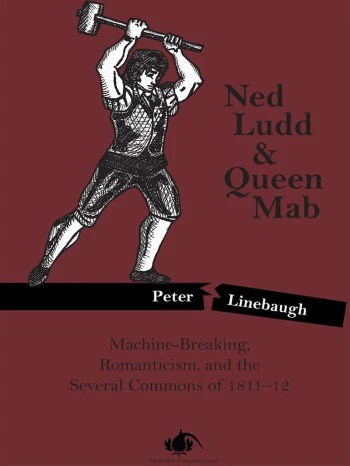
For years, I transposed part of a subtitle, “Machine-Breaking, Romanticism, and the Several Commons of 1811-12” with the title of Peter Linebaugh book, Ned Ludd & Queen Mab, so that I would call the pamphlet, “Ned Ludd and Queer Machines.” On the occasion someone else knew the work, firsthand, they also slipped into, “Ned Ludd and Queer Machines” or maybe, “Queer Machine.”
There is no Department X in The Invisibles. There is a Division X, and I knew that, but for a moment, you and I knew Department X, too. For a moment it existed, and that moment is asynchronous for us, and for us, and for us.
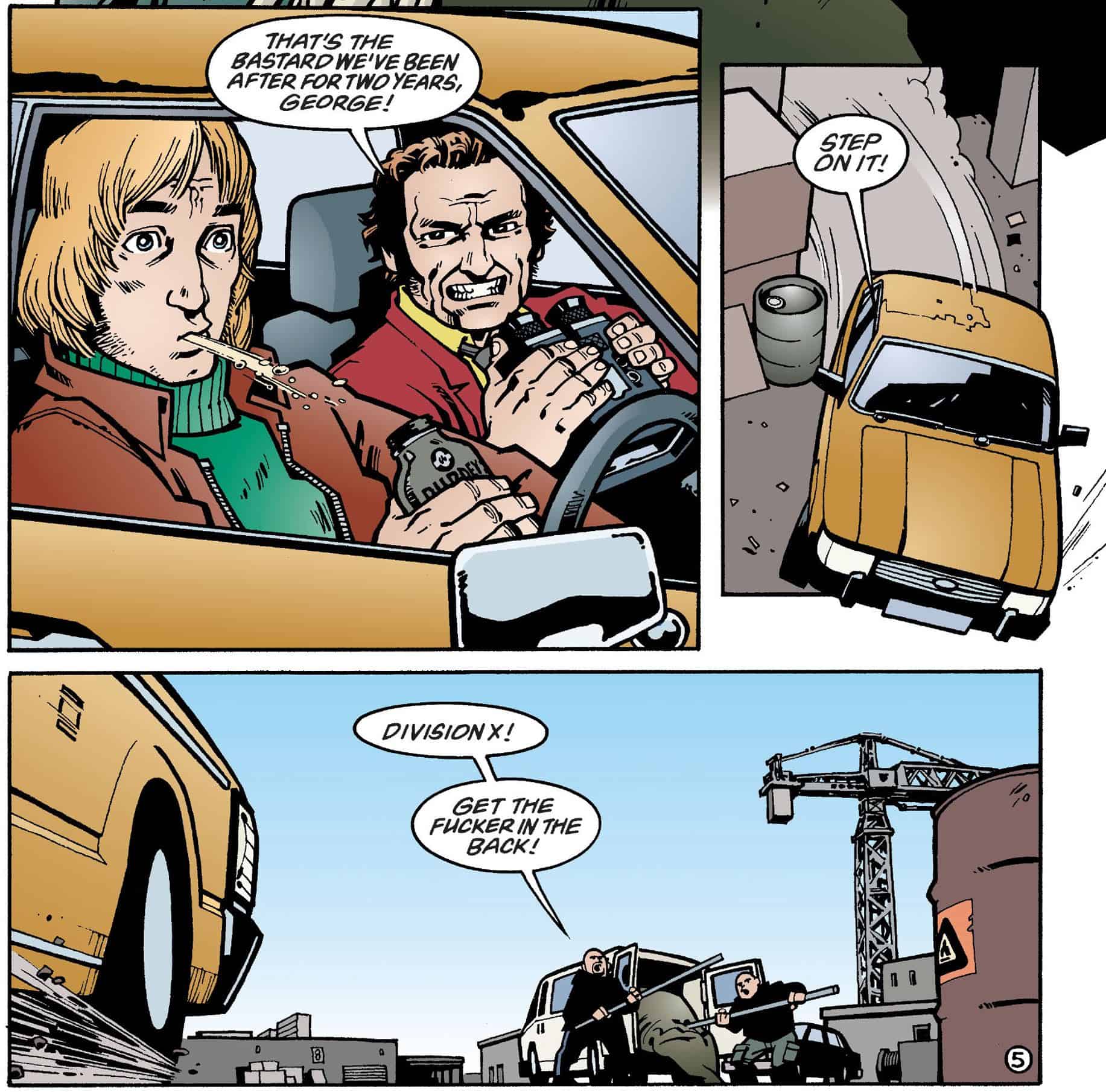
The Invisible Kingdom, an arc near the end of the comic, taking place largely in 1999 and 2012, which were at the time of first publication the recent past and the not-too-distant future, is event-compression. The event-compression jumps us around while the jam session artwork, every few pages drawn by a different penciler, inked by a new inker, allowing the pre-death Beatles to walk by a near-death King Mob. George Harper, who spends part of the arc’s main night looking like a focused Shaggy Rogers in a lost weird futuristic Scooby-Doo, finds himself moved here, placed here, not quite sure the why or what.
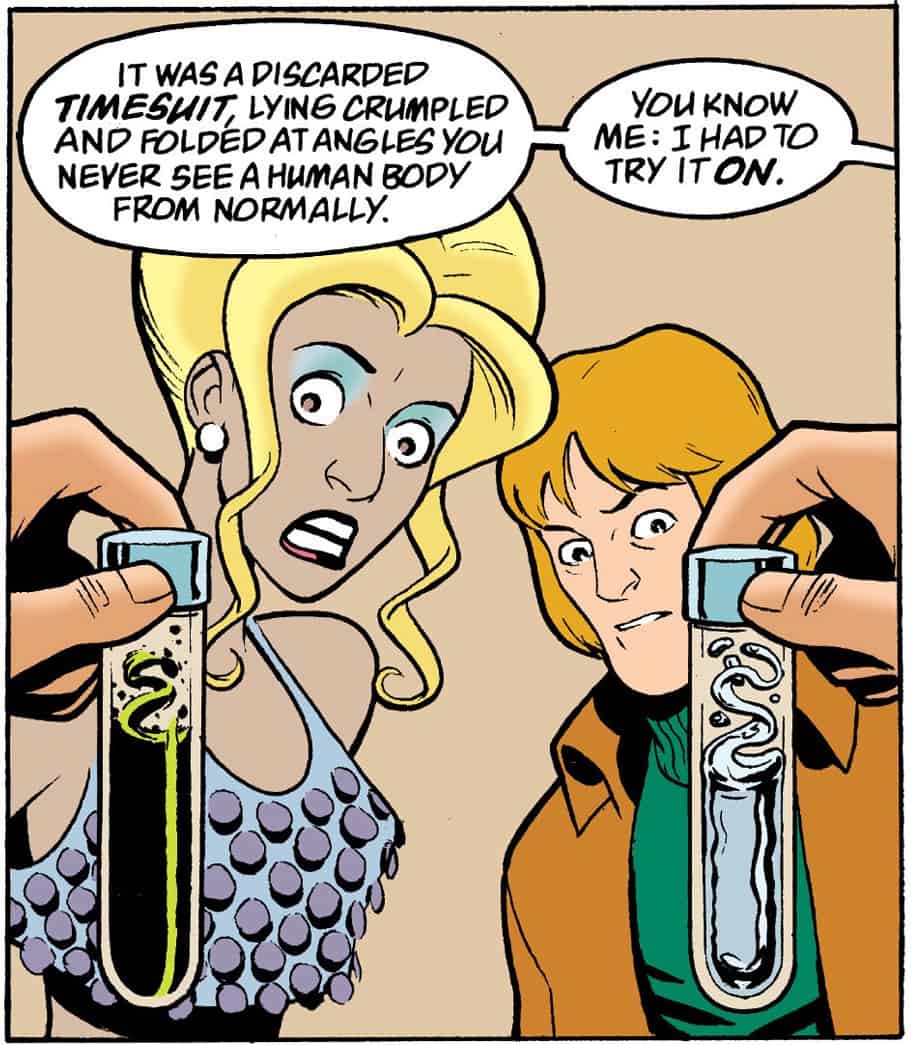
On Scooby-Doo, the baddie in the ghost outfit is usually just a cranky, out of touch landlord. What government is otherwise? A mystery to be calculated by other, wiser detectives than Harper, though he gives it a shot.
George Harper gives up investigating the deep mysteries because when he did that, he was not a great person, and by being a guy who simply does the runaround, he finds he has an identity as a nice enough person.
Dreams carry us place to place. They stitch together what will have no stitches.
When Mob walks his dream corridor in the final comic of The Invisibles, members of Division X stand with members of the 1920s Invisible cell of Queen Mab and an earlier King Mob, as Edith Manning miscarries on the steps of a store, while colorless statuary child figures stand stock still on the stair rails, and Jack Frost cooks the hang of glory from a green rubber glover over the heat of a turntable.
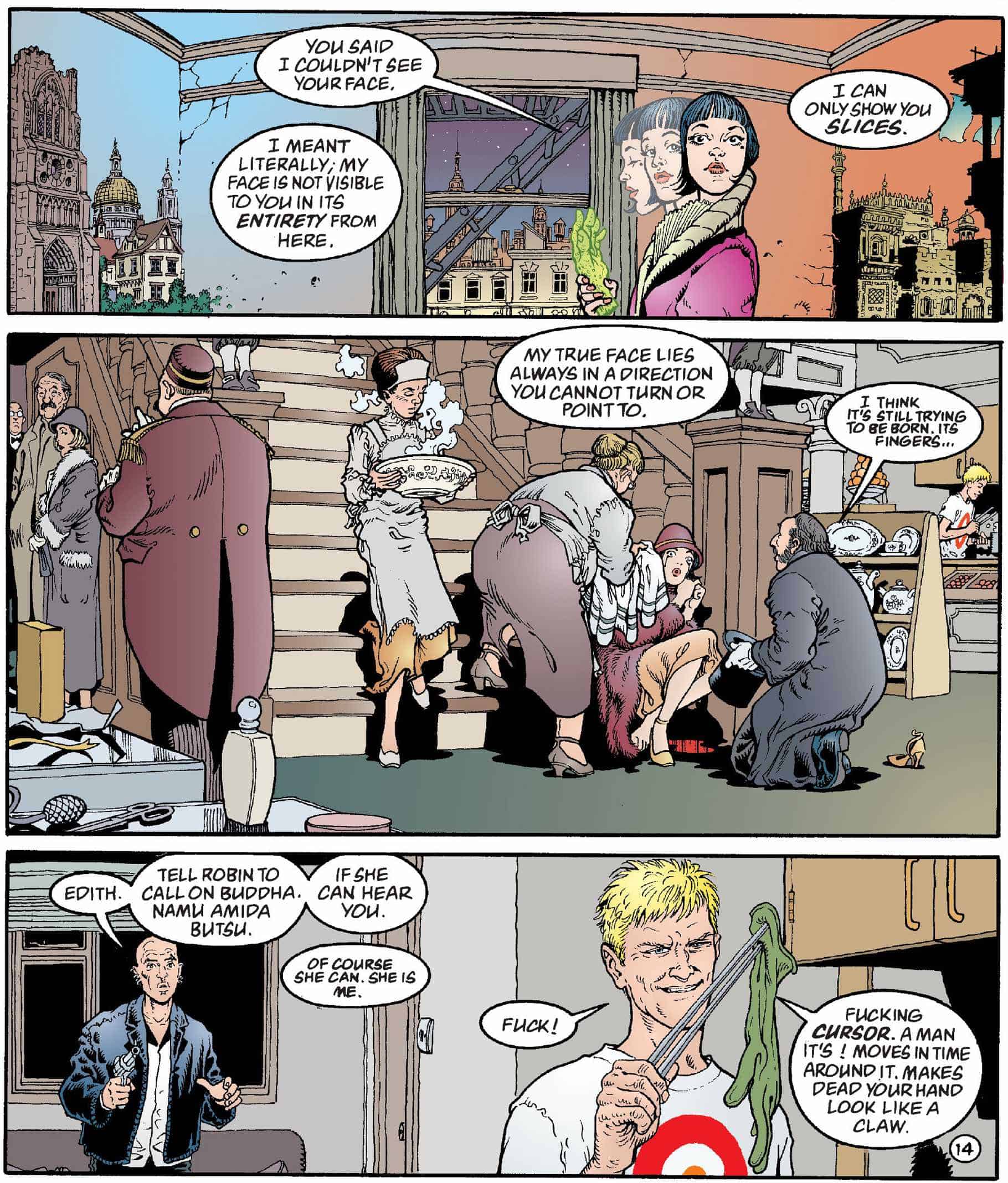
The acid trips, the stoned nights, the self-hypnosis, self-insert, the ghost shudders and hauntological expressiveness. Stitch together something which will have no stitches.
New moons are just the Moon. Shining a light on something changes how we see it, not how it is. Except, it does change how it is. Now, it is illuminated.
How much of my read on The Invisibles is me and what is me being upset or agreeing with Anarchy for the Masses or Amy Poodle for The Comics Journal?
You cannot pick apart all the details down to the last frayed feathered fragment. If you could, you still would not have the in-between. The space between the fingers is as important as whether or not they are your fingers. What occupies the space. What does not.
Helga hates the waiting. Sew. “Cut and paste.”
“I remember my sister complaining about a burning sensation up and down her back,” Mason Lang tells two other Invisibles, “and my mom said something weird… She said, ‘How big the moon looks tonight, like it’s coming down to Earth to sleep.’”
Instead of a dream journal, keep a journal of what you do not dream. Dreams not had.
George Harper, who spends part of The Invisible Kingdom’s main night looking like a very high Shaggy Rogers in a lost weird futuristic Scooby-Doo, finds himself moved here, placed here, not quite sure the why or what. A cut and paste King Mob, near-death in a phone booth, is passed by two living Beatles, their lives ahead of them.
Harper knows where he came from and what he has come to, in the way the tide recalls flux and reflux. When he shoots another Invisible, it is because he likes where he has come to more than what he came from.
Babies crown.
Dung beetles navigate by the moon.
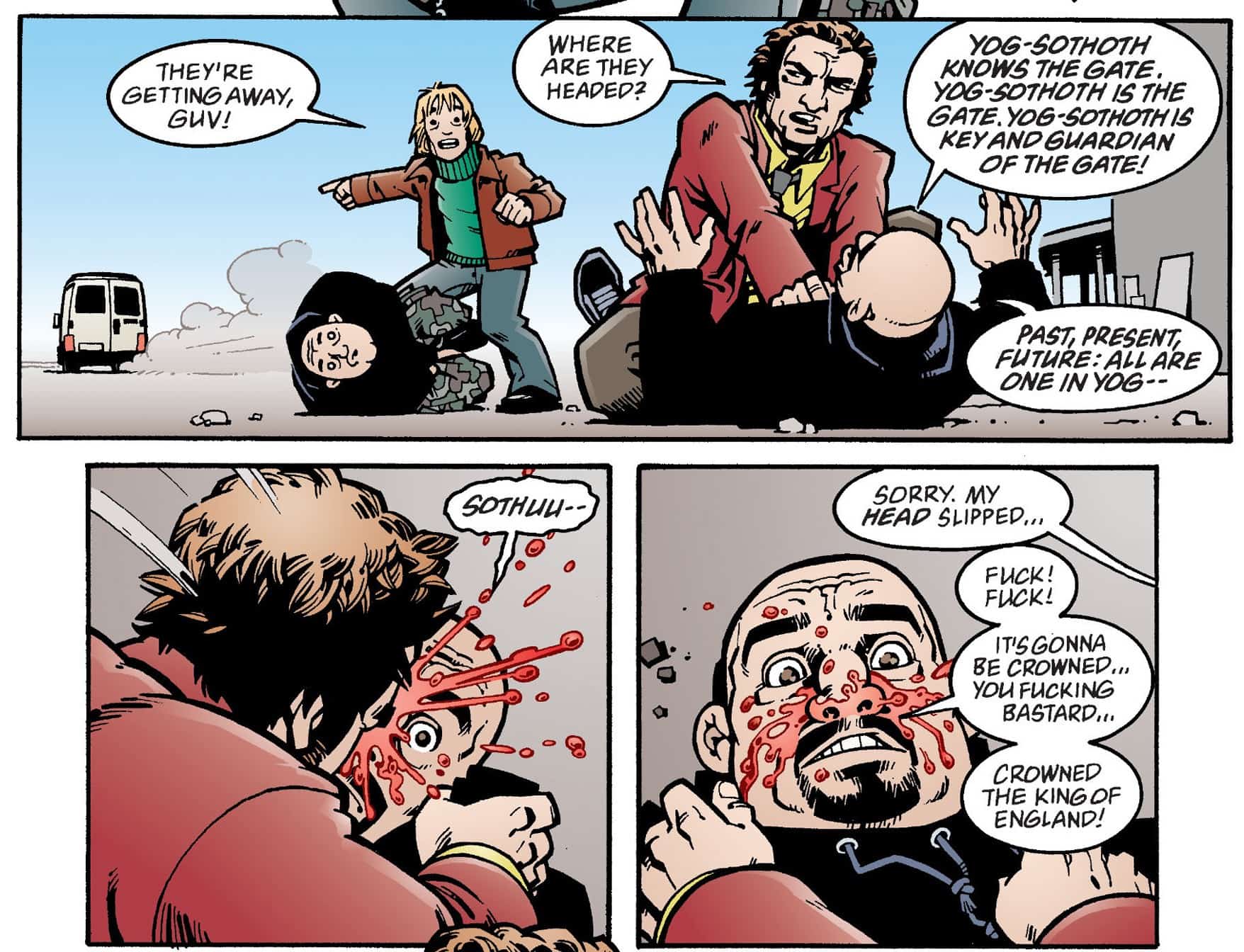
Even if we keep coming back to King Mob and Mason Lang, or how that discussion of menstruation and subliming into divinity reflect on Ragged Robin moving herself, a placenta, through field to foster or embody Barbelith. Not you foe. Injection mold. Not ewe faux. Jacob wool. Walia. Urea. Rhea. The universe’s umbilical nourishment, a cursor in the hand, an eye on us, the waxing and waning paper moon sideshow. Slide screen projections. Hand-shadows on the wall.
*******
NEXT: Whose to Tell
And previously:
- Prologue/Series Bible
- Chapter One: I Was a Librarian’s Assistant (Pt. 1)
- Chapter Two: I Was a Librarian’s Assistant (Pt. 2)
- Chapter Three: Robin Roundabout
- Chapter Four: How Did Helga Get in Here?
- Chapter Five: Boy Our Embarrassment
- Chapter Six: Once I Was a Little Light
- Chapter Seven: Sacrificial Greed
Nothing in There is Nothing Left to Say (On The Invisibles) is guaranteed factually correct, in part or in toto, nor aroused or recommended as ethically or metaphysically sound, and the same is true of the following recommendations we hope will nonetheless be illuminating to you, our most discriminating audience.
Morrison, Grant. The Invisibles. Jill Thompson, Chris Weston, et al. DC Comics. 1994-2000.
Our Sentence is Up: Seeing Grant Morrison’s The Invisibles. Meaney, Patrick. Sequart. 2012.
Anarchy for the Masses: The Disinformation Guide to The Invisibles. Neighly, Patrick and Kereth Cowe-Spigai. Disinformation Books. 2003.
How I Became Invisible. Edited by orbific. <https://audio-orbific.s3.eu-west-2.amazonaws.com/invisibles-zine.pdf>





